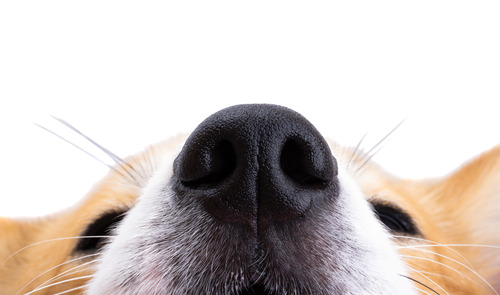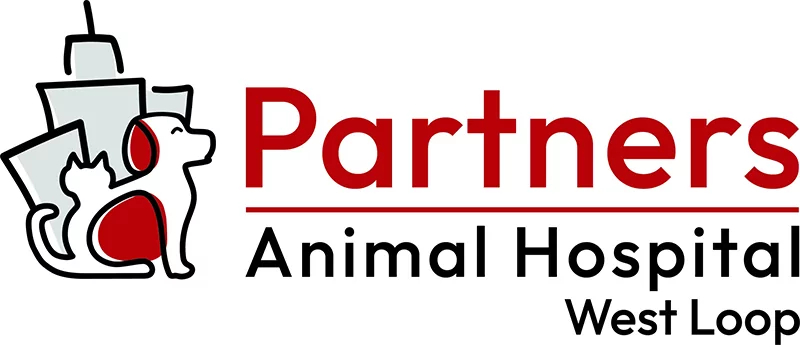Why Is My Dog’s Nose Not Wet?

Dogs’ noses have always been a fascinating topic for pet owners. From their ability to sniff out hidden treats to their seemingly magical sense of direction, a dog’s nose is a powerful and essential tool. But what happens when your dog’s nose isn’t wet? Should you be worried? A wet nose is often associated with a healthy dog, but there are several reasons why a dog’s nose might be dry. Let’s explore the causes, whether it’s a sign of concern, and what steps you should take to ensure your pup’s well-being. If you’re concerned about your dog’s nose not being wet, call Partners Animal Hospital West Loop at (312) 767-4762 or book an appointment online today!
What Does a Wet Nose Mean for Dogs?
A wet nose is often considered a hallmark of a healthy dog. But why is that? The moisture on a dog’s nose serves several important purposes. Firstly, a wet nose helps dogs enhance their sense of smell by trapping scent particles, making it easier for them to identify various smells. Secondly, it aids in regulating their body temperature. Unlike humans, dogs don’t sweat through their skin; instead, they release heat through their paw pads and noses.
Dogs’ noses are kept wet through a combination of mucus production and licking. The mucus, produced by glands inside the nose, helps trap scent particles, while licking keeps the nose clean and moist. However, a dry nose isn’t always a cause for alarm. Many factors can influence the wetness of a dog’s nose, and not all of them are indicative of a health issue.
Potential Reasons Your Dog’s Nose Might Not Be Wet
If your dog’s nose isn’t wet, don’t panic. There are many benign reasons for this, and understanding them can help put your mind at ease. Here are some of the most common causes:
Environmental Factors
Dry air, especially during winter when heaters are running, can lead to a dry nose. Similarly, exposure to the sun for extended periods can cause temporary dryness. These environmental factors are typically harmless and can be resolved with some simple adjustments, such as using a humidifier or providing shade.
Age-Related Changes
Senior dogs often experience changes in their skin and mucus production as they age. This includes their noses becoming drier than they were in their younger years. While this is usually a natural part of aging, it’s still a good idea to monitor for other symptoms that could indicate underlying issues.
Sleep and Activity Levels
It’s normal for a dog’s nose to be dry after they’ve been sleeping. During sleep, dogs don’t lick their noses as frequently, which can lead to temporary dryness. Once they wake up and become active, the moisture typically returns.
Mild Dehydration
If your dog isn’t drinking enough water, their nose might become dry. Dehydration can occur for various reasons, including exercise, hot weather, or not having access to fresh water. Always ensure your dog has access to clean, fresh water throughout the day.
Minor Irritations
Allergies or exposure to irritants such as cleaning products, pollen, or certain types of food can temporarily dry out your dog’s nose. In most cases, this dryness resolves once the irritant is removed.
When Should You Be Concerned About a Dry Nose?
While a dry nose is often harmless, there are times when it could indicate a more serious issue. It’s important to know the signs that warrant veterinary attention. If you notice any of the following along with a dry nose, it’s time to consult your veterinarian:
Cracks, Bleeding, or Scabs
If your dog’s nose is dry to the point of cracking, bleeding, or developing scabs, it could indicate a skin condition, sunburn, or an infection. These symptoms should not be ignored, as they can worsen without treatment.
Persistent Dryness
A nose that remains dry for an extended period, despite changes in environment or hydration, may signal an underlying health problem. Conditions such as autoimmune disorders, hyperkeratosis (thickening of the skin), or certain infections could be the cause.
Changes in Behavior or Appetite
If your dog is acting lethargic, refusing to eat, or showing other unusual behaviors in addition to a dry nose, it’s a sign that something might be wrong. These symptoms could point to fever, dehydration, or another health issue that needs prompt attention.
Nasal Discharge
A dry nose accompanied by nasal discharge, especially if it’s thick, yellow, or green, could indicate an infection or respiratory illness. These conditions often require veterinary treatment to prevent complications.
How to Care for Your Dog’s Nose
Keeping your dog’s nose healthy doesn’t require much effort, but it’s an important part of their overall well-being. Here are some simple tips to maintain a moist and healthy nose:
- Provide Proper Hydration: Ensure your dog has access to clean, fresh water at all times. If your dog is particularly active or it’s a hot day, encourage them to drink more frequently to prevent dehydration.
- Protect Against Environmental Factors: Use pet-safe sunscreen to protect your dog’s nose during sunny days and consider a humidifier if your home is particularly dry. These small steps can make a big difference in maintaining nose health.
- Regular Grooming: Keep your dog’s face clean by gently wiping their nose with a damp cloth if it becomes dirty. Regular grooming also helps you spot any changes in their nose early on.
- Observe for Allergens: If you suspect your dog’s dry nose is due to an allergen, try to identify and eliminate the source. Consult with your veterinarian for advice on managing allergies effectively.
- Visit Your Veterinarian: Routine veterinary check-ups can help identify and address potential issues before they become serious. Your veterinarian can provide tailored advice for your dog’s specific needs.
A dog’s nose not being wet isn’t always a sign of trouble, but if you’re ever unsure, it’s better to err on the side of caution and consult with your veterinarian. Partners Animal Hospital West Loop is here to support you and your pet. Call us at (312) 767-4762 or book an appointment online to address any concerns you have about your dog’s nose or overall health.
About Us
At Partners Veterinary Group, we believe in energizing our team members through shared values, while helping them create value for our clients and patients. Knowing we can help make pets’ and people’s lives better motivates us to continually strive for excellence and love what we do.
Our team consistently works to build educational, supportive, and cooperative work environments that cater to positive experiences and professional growth. We’re constantly evolving, creating innovative ways to deliver cutting-edge medicine to our patients. We equip our teams with tools to enhance their skills and improve their knowledge.
